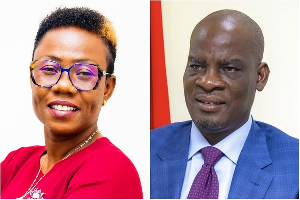Anytime the New Patriotic Party seeks to trumpet its achievements on the macro-economic level, its detractors say ‘but there’s no money in the pockets.’ The NDC and the others have so far managed to draw a somewhat convincing wedge between low inflation, lower interest rates, a stable currency, on the one hand, and the purchasing power of the consumer, on the other hand. As to how this is possible, would baffle any SSS student of economics. But, such has been the reality. Never mind that inflation is the greatest sucker of ones purchasing power. Never mind that high interest rates kill businesses and therefore create unemployment. Never mind that a falling cedi means increasing cost of imports for a country that is even shy to produce toothpicks.
At least, for this reason alone, sympathisers of the NPP should be relieved that slashing a few zeros from the local currency will be a language that can be understood by even a primary school child that something has changed with the money for her candy. And, it is all due to the fiscal discipline and sound economic management of the Kufuor administration that have ensured macro-economic stability.
This week, the Bank of Ghana announced the re-denomination of the cedi, which will be replaced by the new Ghana Cedi in July of next year. Today’s ¢10,000 will become ¢1, as four zeros are knocked off our present day money. The bill has yet to be presented to Parliament, and the debate looks set to be an interesting one. Already, the financial sector and leading economists have offered their views on this radical change – and today, The Statesman would like to suggest some points of our own for consideration.
The benefits of re-denomination have been spelt out by Catherine Ashiley, Head of Issue at the Bank of Ghana, and applauded by others.
Ghana can expect to make savings on the production cost of money, with fewer notes and coins equal to the same value. Smaller volumes of money will make transactions easier, and will enable Ghana to adopt coin-slot technologies such as street parking metres and vending machines. Some of the potential problems – the need for new software and machines to deal with the new money, for example – may actually be turned into opportunities, with local IT developers presented with the chance to develop the necessary systems.
The introduction of the new Ghana Cedi will serve as a physical reminder of the current psychological undercurrent in the Ghanaian economy – we have reached a plateau of macro-economic stability; to re-set our economy, such that ¢1 will be very approximately equivalent to $1 or €1, tells the world that this stability is here to stay.
A more comparable currency may also act as an incentive for Ghana to continue with its development efforts. Currently, we are forced to convert large calculations into dollars, anyway – that ‘universal’ currency. Thinking in cedis even limits our scope – where do we go beyond trillions of cedis? Quadrillions? Quintillions? Sextillions? Septillions? Cotillions? We don’t have the printed money, we don’t have the vocabulary.
Budget calculations, for example, are often cited in US dollars, too; business deals and development packages, also. A stable, workable currency of our own may help Ghana to own the concept of development more – to make useful comparisons with outside, to feel a stronger sense of our own economic growth rather than see big money as a foreign import, to fully embrace the idea of indigenous capitalism and growth.
The launch of a new currency in Ghana coincides with our 50th anniversary celebrations of course – half a century of economic independence, and a new sure sign that the economy of Ghana appears to be in a strong position. It is a testament to how far we have finally come, and the direction we are setting for ourselves in the next stage of our history.
In fact, the money can be used as a new way of celebrating our history and heritage. Banks notes and coins should feature historical and contemporary Ghanaian achievers – they should serve as a reminder of our 50-year history. New, more enduring notes may also state as a sign of our strength – and practically, this is an opportunity to redesign our physical currency so that the crumbling, mould-infested ¢1,000 note becomes a thing of the past. In Australia, a “plastic” polymer note has proved hardwearing and cost-effective. Currently, Ghana recalls and reprints money every year – here is an area where we can make a huge saving, if we are prepared to spend money now. Let this be a case where we opt to invest in the future, rather than make false investments in the cheaper option which won’t last.
There are a number of potential pitfalls, however, which ought to be studied carefully.
Firstly, The Statesman is concerned about the effect of the re-denomination programme on inflation – and advises Government to re-think its inflation targets for next year. Experience elsewhere, for example in the European Union with the introduction of the Euro on 2002, was that many businesses and services took advantage of the situation, using it as an opportunity to ‘round up’ their new prices, thus driving inflation. In Ghana, the calculation of new prices should be simple, as four zeros will simply be knocked off the price. However, a similar trend might emerge – opportunism and confusion might drive up prices.
Core to the programme of re-denomination, and to controlling price increases and inflation, must of course be a concurrent programme of education – to persuade people of the benefits of the scheme and the dangers of inflating their prices, to educate them about the unchallenged value of their money. Economists have spoken particularly about the need to raise awareness about change over in the rural communities, but The Statesman would like to also point out the millions of urban dwellers who will be confused by the new currency or deliberately set out to exploit it. A salary of ¢1m sounds a lot bigger than a salary of 100 new Ghana Cedis – its exact equivalent, and workers need to be convinced of this.
The introduction of the new Ghana Cedi is as big a change as the shift from imperial to metric measurements in the 1970s. It is more significant than the move from driving on the left-hand to the right-hand-side of the road in 1974. It is a change which will affect everyone, and which requires the understanding of everyone to work.
The Statesman is also a little concerned about the six-month transition period, and the timing of the whole exercise. But, our concerns should in no way be seen as diminishing our full endorsement of the zero-slashing exercise. Next year, the attentions of the nation will be very much on the Golden Jubilee and events surrounding it. The Bank of Ghana must make sure that sufficient attention is given to both the publicity of the change and the production of new money – because a situation where the new currency runs out would not augur well for the new dawn!. As for the transition time, this is an aspect of the new legislation which must be keenly debated in Parliament.
Other factors to consider include the impact of the new Ghana Cedi on the introduction of the ECO, still scheduled to be launched in 2009. The advantages of a new monetary system are mostly mid-long term – temporary inflation might result, and the immediate cost of producing new coins and notes will be high – but this is expected to reap long-term savings. However, if the plan is to scrap Ghana’s national currency in just a few years, the investments seem pointless.
Does this mean that the Government of Ghana and the Bank of Ghana has about as much faith in the West African Monetary Zone as we at The Statesman? Certainly, the likelihood of all the member states ever meeting their criteria seems little closer than ever.
The new Ghana Cedi is indeed a sign of the strength of our economy, and the promise of further growth. It is in the details, in the working out of that promise and the education that must accompany it, that we shall see if that promise is fulfilled. All said and done, it is a very positive move.
Business News of Friday, 1 December 2006
Source: Statesman
Editorial: Re-denomination, education must go hand in hand
Entertainment











